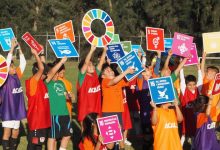Wealthy Nations Crushing Human Development Records, But Poorest Countries Taking a Hit
В документе содержатся обновленные данные по ИЧР: этот сводный показатель отражает валовой национальный доход (ВНД) на душу населения, уровень образования и ожидаемую продолжительность жизни в стране.
Растущее неравенство
По новым оценкам ПРООН, глобальный ИЧР достиг рекордно высокого уровня после резкого снижения в 2020 и 2021 годах, но прогресс был крайне неравномерным. В богатых странах наблюдается рекордно высокий уровень человеческого развития, в то время как половина беднейших стран мира по-прежнему находится ниже уровня до пандемии.
«Растущее неравенство, эскалация конфликтов и беспрецедентные климатические потрясения разъединяют людей в сообществах и регионах. Дезинформация и подрыв доверия разрушают социальную ткань и сокращают пространство для содержательного общественного диалога. Разногласия углубляются в тот момент, когда сотрудничество имеет решающее значение для нашего общего будущего», – заявил Генеральный секретарь ООН Антониу Гутерриш в своем обращении, приуроченном к выходу доклада.
Данные по человеческому потенциалу
Согласно докладу, странами с самым высоким показателем ИЧР являются Швейцария, Норвегия, Исландия, Гонконг (Китай), а Швеция и Дания делят пятое место в рейтинге. Германия и Ирландия занимают 7-е место, Великобритания – 15-е, а США – 20-е.
Россия и Беларусь также относятся к числу стран с очень высоким уровнем человеческого развития по классификации ПРООН: они находятся на 56-й и 69-й строках соответственно. Кроме того, Казахстан и Грузия также включены в список государств с очень высоким ИЧР.
Украина находится в числе стран с высоким уровнем развития, занимая 100-е место в рейтинге. При этом Украина потеряла 18 позиций с 2015 года. По данным ПРООН, в стране был зафиксирован самый низкий показатель Индекса с 2004 года.
Среди государств с наименьшими значениями ИЧР – Сомали, Южный Судан, Центральноафриканская Республика, Нигер и Чад. Показатели КНДР и Монако не были оценены из-за отсутствия данных.
Читайте также:
ООН: большинство женщин живут в странах, которым далеко до гендерного равноправия
«Увеличивающийся разрыв в человеческом развитии, выявленный в докладе, показывает, что тенденция к неуклонному сокращению неравенства между богатыми и бедными странами, наблюдавшаяся в течение двух десятилетий, в настоящее время обращена вспять», – сказал глава ПРООН Ахим Штайнер. По его словам, отсутствие коллективных действий по борьбе с изменением климата, бедностью и неравенством не только препятствует человеческому развитию, но и усугубляет поляризацию и еще больше подрывает доверие к людям и институтам во всем мире.
«Парадокс демократии»
В докладе утверждается, что продвижению международных коллективных действий препятствует «парадокс демократии»: в то время как 9 из 10 человек во всем мире одобряют демократию, более половины респондентов глобального опроса выражают поддержку лидерам, которые действуют вопреки демократическому процессу.
Эксперты обращают внимание на исследования, свидетельствующие о том, что страны с популистскими правительствами имеют более низкие темпы роста экономики. Через 15 лет после прихода к власти популистского правительства ВВП на душу населения оказывается на 10 процентов ниже, чем он мог бы быть при непопулистском сценарии.
В докладе подчеркивается, что экономическая взаимозависимость остается высокой. Авторы отмечают, что ни один из регионов не может обеспечивать себя сам, поскольку все они зависят от импорта основных товаров и услуг. Кроме того, происходит дальнейшее развитие и усложнение всеобщей взаимосвязанности и формирование глобальных общественных благ, таких как планетарные и цифровые блага.
В этом контексте многостороннее сотрудничество играет фундаментальную роль, утверждают в ПРООН, поскольку двусторонние обязательства не способны решить проблемы, связанные с мировой взаимосвязанностью и предоставлением глобальных общественных благ.
Elliot is an award-winning journalist passionate about international affairs and humanitarian causes. Elliot has covered stories from conflict zones and areas devastated by disasters, highlighting critical global issues.




Do you think the increasing inequality mentioned in the article is a major contributing factor to the decline in the least developed countries’ human development index?
As mentioned in the article, the growing inequality indeed plays a significant role in the decline of human development indices in the least developed countries. It exacerbates disparities in access to education, healthcare, and economic opportunities, hindering overall progress. Addressing inequality is crucial for improving the well-being and prospects of these nations.
Why do the wealthiest nations reach record human development levels while the poorest countries are facing decline? How can this disparity be addressed effectively?
Inequality and lack of resources play a significant role in the diverging human development trends among nations. Addressing this disparity requires a multifaceted approach involving economic policies, social programs, and international cooperation. It’s crucial for global leaders to prioritize equitable distribution of resources and access to education, healthcare, and opportunities for all individuals, regardless of their country’s wealth status.
Why are the wealthiest nations seeing such a high level of human development while the poorest countries continue to lag behind? What are the main factors contributing to this inequality?
Well, EmilyJohnson, the disparity in human development between wealthy and poor nations can be attributed to a variety of factors. Wealthier nations often have better access to resources, education, healthcare, and technology, which are essential for overall human development. On the other hand, poorer countries often face challenges such as lack of infrastructure, limited access to quality education and healthcare, political instability, and economic inequalities. Addressing these disparities requires a multi-faceted approach that focuses on promoting equality, improving access to resources, and fostering sustainable development practices.
“Growing inequality, escalating conflicts, and unprecedented climate shocks are driving people apart in communities and regions. Disinformation and undermining of trust are tearing apart the social fabric and shrinking the space for meaningful public dialogue. Disagreements deepen at a time when cooperation is crucial for our common future,” said UN Secretary-General António Guterres in his statement marking the release of the report.
As the global Human Development Index is reaching record high levels, it is concerning to see the stark inequality persist between the wealthiest nations and the poorest countries. Growing disparities, escalating conflicts, and unprecedented climate disruptions are tearing communities and regions apart. Misinformation and trust erosion are fracturing societal bonds and limiting the space for meaningful public discourse. Disagreements deepen at a time when cooperation is crucial for our collective future. – stated UN Secretary-General Antonio Guterres in his address linked to the report.
As the UN Secretary-General pointed out, growing inequality, escalating conflicts, and unprecedented climate shocks are tearing communities and regions apart. Disinformation and undermining trust are eroding the social fabric and narrowing the space for meaningful public dialogue. Disagreements deepen at a time when cooperation is crucial for our collective future.
As a passionate advocate for global equality, it’s disheartening to see the widening gap between wealthy nations and the poorest countries in terms of human development. The uneven progress highlighted in the latest UN report is a stark reminder that cooperation and solidarity are crucial for shaping a better future for all. It’s imperative that we address escalating conflicts, misinformation, and environmental crises that are fracturing communities worldwide. Let’s strive for a more inclusive and sustainable world!
Increasing inequality, escalating conflicts, and unprecedented climate shocks are dividing people in communities and regions. Disinformation and undermining trust are destroying social fabric and shrinking the space for meaningful public dialogue. Disagreements deepen at a time when cooperation is crucial for our common future. – stated UN Secretary-General Antonio Guterres in his statement related to the release of the report.
Growing inequality, escalating conflicts, and unprecedented climate shocks are dividing people in communities and regions. Disinformation and undermining trust are destroying the social fabric and shrinking the space for meaningful public dialogue. Disagreements deepen at a time when cooperation is crucial for our common future.
As an avid follower of global development trends, I find it disheartening that while wealthy nations are breaking human development records, the poorest countries continue to suffer. The growing inequality, conflicts, and climate crises are tearing communities apart and hindering meaningful dialogue. It is crucial for cooperation to take precedence to secure our collective future.
As mentioned in the article, the growing inequality, escalating conflicts, and unprecedented climate shocks are tearing people apart in communities and regions. Disinformation and undermining of trust are destroying the social fabric and shrinking the space for meaningful public dialogue. Disagreements deepen at a time when cooperation is crucial for our common future. – said UN Secretary-General António Guterres in his statement accompanying the report.